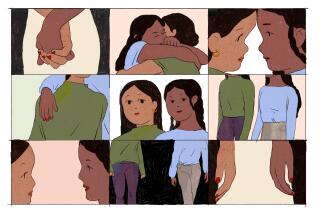A journey back into the light
- Share via
“A Walk to Beautiful” will leave you speechless two times over -- first with despair, then with joy. Neither unmentionable subject matter nor nonexistent commercial prospects can keep this documentary from having a power over your heart that is unparalleled.
Set in Ethiopia and made over a four-year period by director Mary Olive Smith and a devoted team, “Beautiful” introduces audiences to five women who suffer -- and that is truly the word -- from a devastating condition brought on by injuries sustained during childbirth.
Simply put, these women are chronically incontinent: They leak urine at all times because, in most cases, there is a fistula or hole in the birth canal caused by the kind of extended, days-long labor that left their children stillborn.
Because of the stench associated with their condition, these women are ostracized and rejected by everyone, including spouses and even parents. Living in deeply rural parts of the country, women like 25-year-old Ayehu are forced to reside in makeshift hovels and wait numbly for the death they look forward to as a welcome release.
“I would rather have my arm cut off than have this problem,” says 17-year-old Yenenesh. “Then I could at least mix with people. Nothing could be worse than this.” As Australian Dr. Catherine Hamlin was told when she moved to Addis Ababa, Ethiopia’s capital, in 1955, “the fistula patients will break your heart.”
Dr. Hamlin and her late husband Reginald, however, were determined to do something about it. They founded, as a city sign describes it, “Fistula Hospital for women with childbirth injuries,” a place that, as far as these women are concerned, just about performs miracles.
For many of the hospital’s patients, just getting to the front door is a serious challenge. Many of Ethiopia’s villages are so remote it takes a walk of five or six hours just to get to a road (hence the film’s title), a journey to be followed by two or three times as many hours on a ramshackle bus. Dr. Hamlin tells the story of one woman who begged at her local bus stop for six years before amassing the money for the fare.
What they find at Fistula Hospital is a welcoming place -- clean, light and airy and staffed by doctors, many Ethiopian, who are specialists in treating their condition.
One treatment, however, does not fit all: Some women can be cured by surgery to close the fistula (the hospital does some 1,500 a year) while others need to learn daunting exercise programs and other techniques.
Amazed to find so many women with problems like their own, the patients gratefully bond with each other, becoming part of a community after years of being shunned by everyone. As Dr. Hamlin says, “the healing of the mind starts.”
“A Walk to Beautiful” makes a powerful impression, not only because of the nature of the story but because the filmmaking team tells it with delicacy, sensitivity and care. Because they had been abandoned for so long, the women profiled open up to their Western questioners to a remarkable extent, but the film never exploits their candor. In addition, an Ethiopian-flavored score by David Schommer strikes exactly the right tone.
Though only 85 minutes in length, “A Walk to Beautiful” finds time to discuss the causes of this problem, all but eliminated in the West in part because of better medical care. Though contributing causes include devaluation of women, early marriage, chronic undernourishment that leads to bodies that are too small for childbirth and lack of hospitals, the root of this evil, the filmmakers clearly think, is the endemic rural poverty that makes everything worse.
The difference in these women between the day they arrive at the hospital and the day they leave, wearing symbolic new clothes, is as stark as night and day. “I am glad God gave us doctors,” one deeply grateful woman says. By the time “A Walk to Beautiful” is over, you will agree.
--
--
“A Walk to Beautiful.” MPAA rating: Unrated. Running time: 1 hour, 25 minutes. In Amharic, English and Oromiffa with English subtitles. Exclusively at Laemmle’s Sunset 5, 8000 Sunset Blvd. (at Crescent Heights), West Hollywood, (323) 848-3500.



